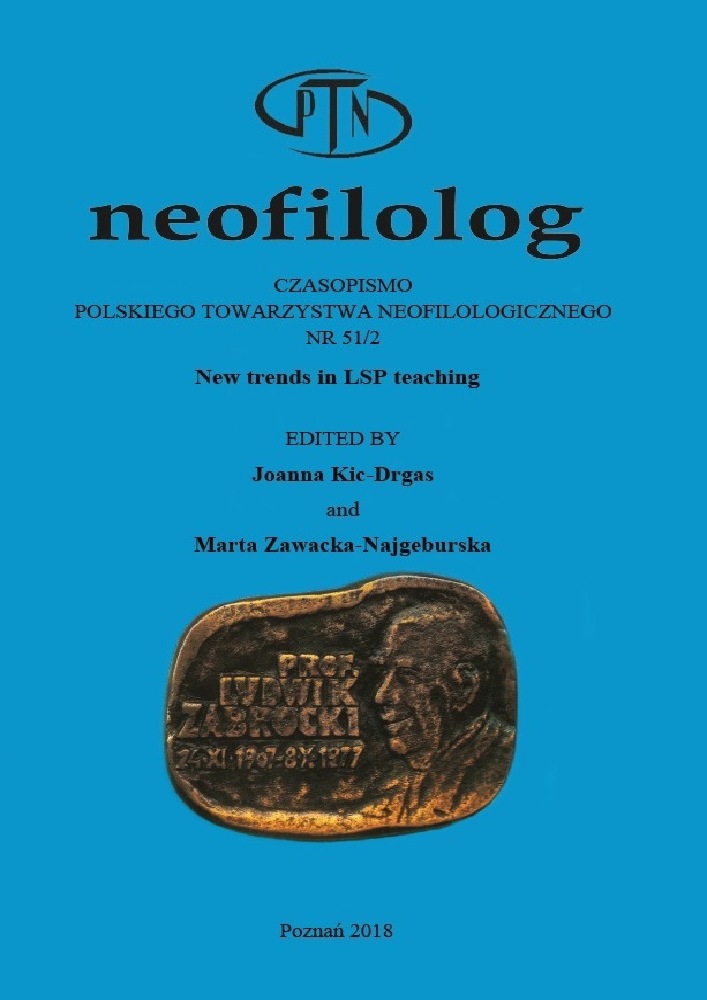Abstract
Designing English for Specific Purposes (ESP) courses is a challenging task. The teacher often has to cope with time constraints, shortage of resources as well as his or her insufficient knowledge of a given field of study. Students enrolled in a course are often consulted about the source of materials for instruction. The process of developing ESP tasks can be made easier and less time-consuming by means of employing student-generated communication activities which draw on learner-based approaches to teaching. The paper contains a collection of student-generated tasks that can be successfully used at the preparatory, follow-up or main stage of an ESP class. In the author’s teaching context on numerous occasions they have triggered lively exchanges between students: discussion, brainstorming, or negotiation. Student-generated activities naturally develop collaboration and autonomy, which are essential in the workplace environment. Just like communication skills, they have to be taught explicitly due to the fact that in the area of soft skills there exist considerable differences at the personal and culture-specific level. Finally, since students’ specialist knowledge is usually much better than that of the teacher, student-generated activities tend to be to the point, up-to date, or more precise with respect to the course objectives.
References
Anthony L. (2007), The teacher as student in ESP course design (in) Wykład inauguracyjny na sympozjum pod tytułem 2007 International Symposium on ESP & Its Applications in Nursing and Medical English Education. Kaohsiung. Online: http://www.laurenceanthony.net/research/20071005_06_fooyin_keynote/20071005_06_fooyin_keynote_proc.pdf [access date: 02.08.2018].
Campbell C., Kryszewska H. (1992), Learner-based teaching. Oxford: Oxford University Press.
de Chazal E., Moore J. (2013), Oxford EAP. A course in English for academic purposes. Oxford: Oxford University Press.
Deller S. (1990), Lessons from the learner. London: Longman.
Dubin F., Olshtain E. (1986), Course design. Cambridge: Cambridge University Press.
Feez S. (1998), Text-based syllabus design. Sydney: National Centre for English Language Teaching and Research.
Flowerdew L. (2013), Needs analysis and curriculum development (in) Paltrige B., Starfield S. (eds), The handbook of English for specific purposes. Chichester: John Wiley & Sons, Inc, pp 325-346.
Gajewska-Skrzypczak I., Sawicka B. (2016), Język specjalistyczny na uczelni technicznej. Refleksje nauczycieli praktyków (in) “Języki Obce w Szkole”, No 3, pp. 5.
Lai E., Dicerbo K., Foltz P. (2017), Skills for today: what we know about teaching and assessing collaboration. London: Pearson. Online: http://www.p21.org/storage/documents/Skills_For_Today_Series-Pearson/Collaboration_White_Paper_FINAL.pdf [access date: 27.03.2018].
Lindstromberg S., Boers F. (2008), Teaching chunks of language. Rum, Austria: Helbling Languages.
Maley A. Using minimal resources: using questions. Part 1. Online: http://www.onestopenglish.com/methodology/minimal-resources/skills/minimal-res ources-using-questions-part-1/146548.article [access date: 18.09.2017].
Meddings L. (2011), 20 steps to teaching unplugged. [seminar] British Council. Online: https://www.teachingenglish.org.uk/article/20-steps-teaching-un plugged [access date: 15.09.2017].
Metusalem R., Belenky D.M., DiCerbo K. (2017), Skills for today: what we know about teaching and assessing communication. London: Pearson. Online: http://www.pearsonlearningnews.com/wp-content/uploads/2018/02/communication-skills-final.pdf [access date: 27.03.2018].
Tennant A. (2017), Minimal resources: teaching vocabulary. Online: http://www.onestopenglish.com/methodology/minimal-resources/vocabulary/m inimal-resources-teaching-vocabulary/146544.article [access date: 18.09.2017].
Thornbury S. (2017), M is for manifesto. [Blog] An a-z of ELT. Online: https://scottthornbury.wordpress.com/tag/teaching-unplugged [access date: 17.09.2017].
NETOGRAPHY
https://answergarden.ch [access date: 09.10.2017]
https://bubbl.us [access date: 18.03.2018]
https://conceptboard.com [access date: 18.03.2018]
https://flask.io [access date: 23.03.2018]
https://pl.padlet.com [access date: 09.09.2017]
https://surveyplanet.com [access date: 25.03.2018]
https://todaysmeet.com [access date: 09.10.2017]
https://www.tricider.com [access date: 09.10.2017]
License
Copyright (c) 2018 Neofilolog

This work is licensed under a Creative Commons Attribution-NoDerivatives 4.0 International License.
Authors
Authors of texts accepted for publication in Neofilolog are required to complete, sign and return to the Editorial team’s office the Agreement for granting a royalty-free license to works with a commitment to grant a CC sub-license.
Under the agreement, the authors of the texts published in Neofilolog grant Adam Mickiewicz University in Poznań a non-exclusive, royalty-free license and authorize the use of Attribution-NoDerivatives 4.0 International (CC BY-ND 4.0) Creative Commons sub-license.
The authors retain the right to the free disposal of the work.
Users
Interested Internet users are entitled to use works that have been published in Neofilolog since 2017, under the following conditions:
▪ attribution – obligation to provide, together with the distributed work, information about the authorship, title, source (link to the original work, DOI) and the license itself.
▪ no derivatives – the work must be preserved in its original form. Without the author's consent, it is not possible to distribute the modified work in the form of translations, publications, etc.
Copyrights are reserved for all texts published since 2017.
Miscellaneous
Adam Mickiewicz University in Poznań retains the property right as a whole (layout, graphic form, title, cover design, logo etc.).

